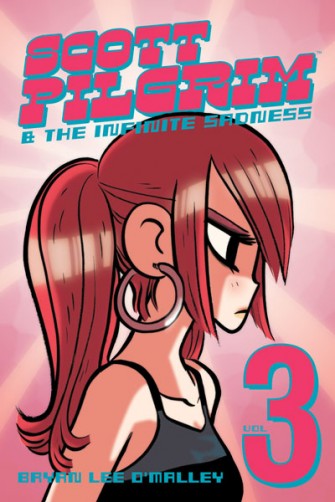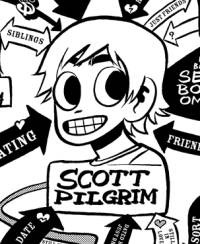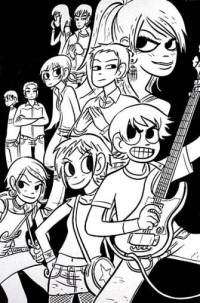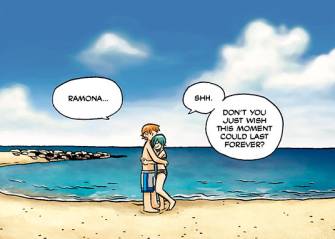
December 30, 2009
 CR Holiday Interview #10—Chris Mautner On Scott Pilgrim
CR Holiday Interview #10—Chris Mautner On Scott Pilgrim





 Chris Mautner
Chris Mautner and I shared a comics shop before either of us did any work related to comics: Joe Miller's
The Comic Store in Lancaster, Pennsylvania. We met in the 1990s after I had moved from central Pennsylvania to Seattle. It was my pleasure to use his work at
The Comics Journal in the late 1990s. He's since gone on to a fine run of writing about comics for sources as wide-ranging as the
Harrisburg Patriot-News, his own
Panels and Pixels and
CBR's intimidating comics blog
Robot 6. He submitted a short list that included
Bryan Lee O'Malley's
Scott Pilgrim. I think that's undoubtedly one of
the comics of the last ten years -- look at those covers! -- and I was excited to mull over its success with Chris. -- Tom Spurgeon
*****
 TOM SPURGEON: Here's a simple question, I hope. How did you discover the
TOM SPURGEON: Here's a simple question, I hope. How did you discover the Scott Pilgrim
work, and if your relationship has changed since that initial encounter, how would you describe those changes? Do you like it more now than you did at first, for example?
CHRIS MAUTNER: If memory serves I discovered it a bit before the third volume came out, which would be around ... [sound of shuffling papers]... 2005? 2006? Somewhere around then. I believe like most folks I learned about the series through word of mouth over the Internet. I remember Heidi raving about it at the time and a few other folks as well. Remember
that store Riot that Jason Richards owned? He'd always talk up
SP whenever I was in his store and I believe I ended up buying the first two volumes from him. It was the sort of thing where "everyone says this is awesome, so I suppose I should at least give it a try." To my delight and surprise, I enjoyed it thoroughly, which is usually not the case in those sorts of instances.
I definitely think my appreciation for the series has deepened over time, if only because O'Malley has shown that he's not interested in having the series just be a light, fluffy comedy. There are those elements, of course, and I enjoy them for what they are, but it's apparent with each subsequent volume that he's trying for something a bit more emotionally complex and studied than a simple action-flavored rom-com, if I can use that abysmal term.
SPURGEON: One of the things most obviously known and celebrated about the comic is its assimilation of videogame approach to visuals, characterization, timing and even narrative structure. You among all the writers about comics I know have a background writing about videogames, and I wonder how much the knowledge you have of that field drives your appreciation of O'Malley's work? Beyond noting those similarities, do you think O'Malley is using them in a creatively satisfying way? Is there a specific moment or two from the books that speak to you this way?
MAUTNER: There have, of course been comics about video games before --
Penny Arcade springs immediately to mind, and I'm sure there were Donkey Kong and
Zelda comics back in the day -- but O'Malley is the first cartoonist to my mind to use videogame tropes as metaphors for the characters' inner emotions and states of mind. I know some critics find them kind of glib, I think that was a sticking point for whoever it was that wrote that negative review in
TCJ, as though he's doing them "just because" in that kind of facile
Dennis Miller sort of way, but I think that's too easy a complaint. It seems easily apparent to me that these references carry more significance than "Hey,
Sonic. I used to play that, too."
It's important to note, I think, that most of the references are what one would consider "old-school." There's a nostalgia factor at work there (deliberately so, I think). O'Malley doesn't reference "
Halo" or "
Madden" or whatever the big video games of the past few years have been -- I've been out of the gaming scene for awhile -- but the big "classic" titles like
Street Fighter, Sonic the Hedgehog and
Super Mario World. I think these gamers are a real cultural touchstone for a lot of people from O'Malley's generation, in the same way that, say, the
Beatles and
Stones were for Baby Boomers or Saturday morning cartoons were for Gen Xers, if I can make a ridiculous statement like that.
I actually think O'Malley's videogame references are one of his more obvious tics. Everyone notices them but no one seems to really notice or say much about his manga and anime influences (other than Jog, who made it the focal point of his interview with him at SPX two years ago). He's one of the first (if not the first) North American cartoonists to successfully incorporate manga idioms into his own style. I hate to say it, but most of the other "OEL" creators, to my mind, come off as desperately trying to ape manga but only getting the surface elements and coming off as ill-thought out and shallow. I don't think you can say that about
Scott Pilgrim.
In many ways I see
Scott Pilgrim as the dividing line between the new and upcoming generation of cartoonists and the established folks. It's a demarcation point, a push pin in the time line, same as
Zap Comix was in the '60s and
Love and Rockets was in the '80s. I'm not making an aesthetic comparison here, I'm saying in terms of a historical shift,
Scott Pilgrim is something you can point to and say "Here is when a new generation of cartoonists started drawing on influences outside of the traditional comics sphere of influence (
EC, the
undergrounds,
Marvel/
DC) and looking to other works, most notably
manga." Does that make any sense?
 SPURGEON: Are there any ways that you feel at a remove from the work? It's by a younger cartoonist, and I remember when I first started reading works by cartoonists from a generation emerging after my own there were frequently ideas and approaches I found tricky to negotiate. How do you reconcile with this comic, and maybe comics generally, that are outside your own immediate experiences? Put another way, do you feel that there's enough that's universal in
SPURGEON: Are there any ways that you feel at a remove from the work? It's by a younger cartoonist, and I remember when I first started reading works by cartoonists from a generation emerging after my own there were frequently ideas and approaches I found tricky to negotiate. How do you reconcile with this comic, and maybe comics generally, that are outside your own immediate experiences? Put another way, do you feel that there's enough that's universal in Scott Pilgrim
that people can react to it no matter if they're in that headspace and that general world right now? What exactly are those elements?
MAUTNER: Good question. I suppose I feel a bit of a reserve in that I'm in my late 30s and am married with kids and have a midlife crisis waiting for me on the horizon. The sort of angst that Scott and his crew are engaged in -- figuring out who they are, what they want to do with their lives, if they're capable of love and commitment -- is something I've already been through.
Having said that, it's not like I can't identify or remember having those sorts of experiences and feelings, even if I didn't experience them as intensely -- or comically -- as Scott. I think O'Malley is touching on some pretty universal emotions. More to the point, I think there's bit of wish fulfillment in that Scott Pilgrim is how we'd like our 20s to be -- to be in a band and going to clubs and bars and having a large group of lovable friends and constantly saying witty things. I think O'Malley's genius lies in how he manages to subvert that in the last two volumes, hinting that Scott's feckless ways may be entertaining, but isn't really that great a way to live your life.
Honestly, I'm not sure I've ever come across a comic that made me feel on the outside looking in. I think a good comic invites you in and makes you feel a part of whatever world it's creating and a bad one leaves you standing awkwardly around with a confused look on your face. I suppose that's too simplistic an answer though.
What about you? Did you have trouble accessing Pilgrim in the way you describe? Did the anime and game references leave you scratching your head?
 SPURGEON: Not really, I guess the references I don't get kind of blow by. I realize afterwards I might not be understanding some of the material on a certain level, but it doesn't
SPURGEON: Not really, I guess the references I don't get kind of blow by. I realize afterwards I might not be understanding some of the material on a certain level, but it doesn't feel
like I'm missing out, if you know what I mean. I'm sort of surprised how comfortable the work feels to me. Maybe I've adjusted to seeing those things through other people's eyes, as you suggest. It does sort of feel like I'm hearing about my friends' kids and their circle of friends than about my own experiences or those of my peer group. But the experience seems grounded and real to me, even if it's on somebody's plate down the table rather than on my own. The characters work for me. What is it that O'Malley does that people are able to imprint on or just enthuse over when it comes to the characters in the books?
MAUTNER: I think the characters are the central appeal of the series. I think O'Malley's characters and how he's deepened his portrayal of them over time, so that even walk-ons like
Young Neil are shown to have a bit of depth and and complexity to them, is what continues to draw people to the series. I think it's really as simple as O'Malley's cast is filled with likable people that resemble folks we know or have bumped into just enough to allow for reader identification.
Again, I think that issue of fantasy and wish fulfillment plays into the series' success as well. Who wouldn't want to live a life where you get to fight robots and ninjas, play bass in a band and have a witty gay roommate while trying to win the heart of your true love?
SPURGEON: I think this was true of Peter Bagge's work in the 1990s, but do you think people dismiss or underestimate O'Malley's work because it's frequently funny and drawn in a lively fashion? Do you feel the general reaction to Scott Pilgrim
has exposed anything about how we look at comics this decade, what we like and dislike and why?
MAUTNER: You forgot to mention the fact that it's been very successful. If there's one thing people are quick to hate, it's something that everyone else loves, especially a quick success that comes from a relative newcomer like O'Malley. To answer your question: yes, I do think people tend to dismiss
SP because it's funny and lively. It's not a problem that's particular to comics. It's the old "comedies never win Oscars" thing. I think because it's funny and cartoony, and has stuff like ninjas and video game references,
SP is seen as lightweight, middlebrow fare. I don't think it is at all, but I think that's the general perception by some critics, especially those in the more art/indie comix side of the room.
Like I said earlier, I think for better or for worse,
Scott Pilgrim has become the standard bearer for the new generation of comics and cartoonists who draw from more sources than just
Chris Ware or
Frank Miller. People like
Hope Larson (duh),
Brandon Graham,
Corey Lewis,
Jason Shiga, a lot of the
Oni and
SLG folks, etc.
 SPURGEON: I believe this is the only work discussed in this short series of interviews that's serialized in book form, which interests me for a lot of reasons. There's something about the experience of a sprawl of work, where the people following the work get to return to it time after time. Given that you've seen his work over a number of years in this decade, how is O'Malley a different cartoonist in book five than he was in book one? In what ways has he managed to sustain a level of visual quality that allows the series to cohere?
SPURGEON: I believe this is the only work discussed in this short series of interviews that's serialized in book form, which interests me for a lot of reasons. There's something about the experience of a sprawl of work, where the people following the work get to return to it time after time. Given that you've seen his work over a number of years in this decade, how is O'Malley a different cartoonist in book five than he was in book one? In what ways has he managed to sustain a level of visual quality that allows the series to cohere?
MAUTNER: One of the best things for me about reading
Scott Pilgrim is you get to see O'Malley steadily improve as an artist and storyteller. His line has become a lot more confident and tighter as the books have progressed. His storytelling skills have increased exponentially as well. It's exciting to see him take chances with the narrative, via flashbacks or what have you. You get the sense he's constantly trying to up his game. It's like you're watching an artist turn from neophyte -- for want of a better word -- to professional, but over the course of one series instead of from work to work, which is usually the case these days.
 SPURGEON: One of the nice things about these books is that there is a sense of progression, a growing sense of maturity without that notion being pressed -- one of the great traditional strengths of serial art when it's done well. Do you also look at these books in terms of the ideas they communicate on the issues broached? Does
SPURGEON: One of the nice things about these books is that there is a sense of progression, a growing sense of maturity without that notion being pressed -- one of the great traditional strengths of serial art when it's done well. Do you also look at these books in terms of the ideas they communicate on the issues broached? Does Scott Pilgrim
say something to you about idea like commitment and friendship and love?
MAUTNER: Oh yeah, absolutely. I think those are the main themes of the series -- as a former English major, I'm always looking for "themes." Actually, I think the major theme of
SP is the issue of maturity, in the sense of being willing to change your personality or your bad behavior in order to make a more stable and happy life for yourself. There's a scene in Volume 5 where Ramona calls Young Neil an asshole and he replies, "I'm young, I'll grow out of it." It occurs to me in rereading these books that that line is pretty much the epigraph for the series as a whole. Only I think O'Malley would put a question mark at the end of that sentence.
SPURGEON: Do you think the fact these books are regarded differently for their almost instant relative success in the comics world and now the film puts pressure on a project like this one, or even potentially changes the work from what it might have been?
MAUTNER: Well, success is a bitch and the fact that it's being made into a film that shows all signs of becoming a cult hit will probably create even more of a backlash against the books. I think in the case of
Scott Pilgrim, it's pretty clear that O'Malley has had the basic framework of his story set up from the beginning and isn't going to do very much to change it at this point just to answer to the prevailing winds of angry reviews or message board posts or what have you. I've got no business giving anyone career advice, but I hope that whatever O'Malley does for his next project after SP he doesn't attempt some sort of super-serious dramaturgy just to show that he is indeed capable of handling
serious stuff. I think that would be a mistake.
 SPURGEON: How much do you think your opinion of the work could change according to how the series ends? Do you feel sometimes that we rush to judgment about books given that they're frequently serialized either in print or on-line?
SPURGEON: How much do you think your opinion of the work could change according to how the series ends? Do you feel sometimes that we rush to judgment about books given that they're frequently serialized either in print or on-line?
MAUTNER: Yes, we do frequently rush to judgment, but that's human nature. How many times do we avoid a movie based on the trailer or TV show based on the first episode, etc.? Certainly I think we can both rattle off a number of comics with lengthy stories we've passed on after only reading an issue or two. It's certainly possible that the final two volumes of
SP could completely alter our perception of what's come before, though I hope it would do so in a good way.
SPURGEON: Where would you detect or how would you measure the book's influence? What's important and emblematic of the decade about Scott Pilgrim? Why are people singularly disappointed when it doesn't appear on best-of lists or enter into the conversation about books of the decade?
MAUTNER: Are people disappointed? I'm kind of at a loss as to what the general consensus is on the series. I know there is a huge fan base and some folks who hate it but that's about it.
 SPURGEON: All I mean is that
SPURGEON: All I mean is that Scott Pilgrim
has very, very devoted fans who are confident of its quality to the point where it not making a list is a cause for indicting that list. I've seen a couple of comments like "No Scott Pilgrim? No way!" I haven't seen, "No The Ticking? No way!" I think that people are so willing to stick up for it is an admirable quality, and suggests how hard the work has hit with a lot of its readers.
MAUTNER: It does seem like it tends to get ignored whenever people make up those end of the year lists though doesn't it? I, for example, completely forgot until working on this with you that volume five came out this past February! I probably wouldn't haven't even thought to have included it on my best of '09 list otherwise. And I like
Scott Pilgrim! I tend to think that's because it came out early in the year and there have been so many good books in general this year -- to offer another movie analogy, it's the old "the academy only nominates movies that come out in the fall" schtick). I do think
Scott Pilgrim gets buried a little bit just by the weight of quality work that's out there. Our inner snobs are probably pushing to dismiss it because it is so light and -- delightfully -- silly at times. It's not
about big, weighty issues like
Footnotes In Gaza or engage in lots of obvious formalist tricks like
Asterios Polyp. Has volume five been on anyone's "best of list" so far this year?
SPURGEON: I'm sure it has been.
MAUTNER: Would you include it on yours?
SPURGEON: I haven't even begun to think about mine yet. I get your point, though.
MAUTNER: I think ultimately
Pilgrim's influence will be seen in the works of the coming generation. Like I said, I think this series is going to be a touchstone for creators of a certain age and I wouldn't be too surprised if the next couple of years of
CCS and
SVA grads start listing
Scott Pilgrim as one of their biggest influences and we see it referenced in their own comics. I think once the series is done and people have time to contemplate the whole work, its critical cachet will go up a bit as well.
*****
*
Scott Pilgrim, Volume One: Scott Pilgrim's Precious Little Life, Bryan Lee O'Malley, Oni Press, softcover, 168 pages, 9781932664089, 2004, $11.95
*
Scott Pilgrim, Volume Two: Scott Pilgrim vs. the World, Bryan Lee O'Malley, Oni Press, softcover, 200 pages, 9781932664126, 2005, $11.95
*
Scott Pilgrim, Volume Three: Scott Pilgrim & the Infinite Sadness, Bryan Lee O'Malley, Oni Press, softcover, 192 pages, 9781932664225, 2006, $11.95
*
Scott Pilgrim, Volume Four: Scott Pilgrim Gets It Together, Bryan Lee O'Malley, Oni Press, softcover, 216 pages, 9781932664492, 2007, $11.95
*
Scott Pilgrim, Volume Five: Scott Pilgrim vs. The Universe, Bryan Lee O'Malley, Oni Press, softcover, 184 pages, 9781934964101, 2009, $11.95
*****
This year's CR Holiday Interview Series features some of the best writers about comics talking about emblematic -- by which we mean favorite, representative or just plain great -- books from the ten-year period 2000-2009. The writer provides a short list of books, comics or series they believe qualify; I pick one from their list that sounds interesting to me and we talk about it. It's been a long, rough and fascinating decade. Our hope is that this series will entertain from interview to interview but also remind all of us what a remarkable time it has been and continues to be for comics as an art form. We wish you the happiest of holidays no matter how you worship or choose not to. Thank you so much for reading
The Comics Reporter.
*
CR Holiday Interview One: Sean T. Collins On Blankets
*
CR Holiday Interview Two: Frank Santoro On Multiforce
*
CR Holiday Interview Three: Bart Beaty On Persepolis
*
CR Holiday Interview Four: Kristy Valenti On So Many Splendid Sundays
*
CR Holiday Interview Five: Shaenon Garrity On Achewood
*
CR Holiday Interview Six: Christopher Allen On Powers
*
CR Holiday Interview Seven: David P. Welsh On MW
*
CR Holiday Interview Eight: Robert Clough On ACME Novelty Library #19
*
CR Holiday Interview Nine: Jeet Heer On Louis Riel
*****

*****
*****
posted 2:00 am PST |
Permalink
Daily Blog Archives
November 2019
October 2019
September 2019
August 2019
July 2019
Full Archives


